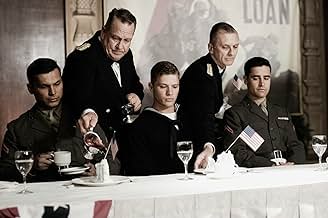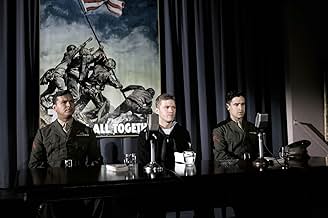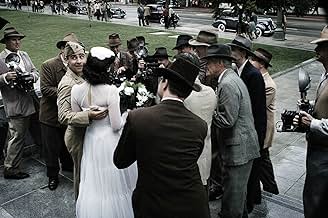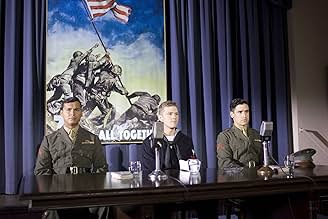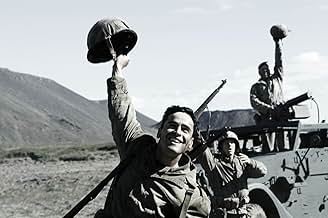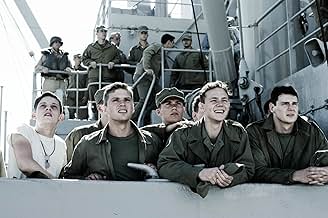Las historias de vida de los seis hombres que izaron la bandera en la batalla de Iwo Jima, un punto de inflexión en la Segunda Guerra Mundial.Las historias de vida de los seis hombres que izaron la bandera en la batalla de Iwo Jima, un punto de inflexión en la Segunda Guerra Mundial.Las historias de vida de los seis hombres que izaron la bandera en la batalla de Iwo Jima, un punto de inflexión en la Segunda Guerra Mundial.
- Dirección
- Guión
- Reparto principal
- Nominado para 2 premios Óscar
- 16 premios y 28 nominaciones en total
Reseñas destacadas
I must admit, this one has elements of greatness in almost every department, but somehow these don't quite glue together as intended. The film seems to suffer from three evenly strong-handed approaches. The script by Paul Haggis eagerly wants to take us on an emotional roller-coaster in the second half, where the focus increasingly shifts to the story of Ira Hayes in the aftermath of the battle. There's obviously a strong hand of Steven Spielberg, who always wants to show us the human side of the story, which Clint obviously wants too, but he tends to do it in a different way. There seems to be a clash of wills, with these three major forces at work here. Ultimately, FLAGS OF OUR FATHERS is not about the war proceedings itself, but how the war affected the men who fought in it themselves, and how they refused to be seen as heroes.
It's hard to dislike any of Clint Eastwood's films and with this one, and the follow-up LETTERS FROM IWO JIMA, he made two films of epic proportions, that will undoubtedly compete for the Oscars. Both of the films that is, as they were released by different distributors, "Flags" is with Dreamworks and "Letters" with Warner Brothers.
We'll see, so far, so good. I wasn't blown away by this one, but certainly a film to respect. Difficult to judge this, before seeing the follow-up LETTERS FROM IWO JIMA, which shows the Japanese perspective of the story. I strongly suspect Clint saved the best for last and that "Letters" will be his ultimate showcase.
Camera Obscura --- 7/10
That one picture is said to be the most reproduced picture in the history of photography.
I toured Iwo Jima in 2000 with my father, a private in the 5th Marine Division, who, along with the flag raisers, landed on Iwo Jima on February 19, 1945 -- the opening day of what would be the costliest battle in the history of the U.S. Marine Corps.
I can't say enough good things about the realism of Clint Eastwood's "Flags of our Fathers." Visually, the movie made me think that I was back on Iwo Jima, and emotionally, I felt like I was witnessing what I had been told by Iwo survivors and what I had read in Richard E. Overton's "God Isn't Here: A Young American's Entry into World War II and His Participation in the Battle for Iwo Jima."
James Bradley's book "Flags of our Fathers," is wonderful, and this movie of the same name is very faithful to his book.
But, the editing of the movie takes the viewer through so many flash-backs and flash-forwards that it's hard to keep things straight -- even if you have read the book!
The movie opens with Harve Presnel (I think it was Harve) playing the role of what I thought was a narrator. Later, it looks like he's just one of many people that James Bradley interviewed for his book.
I was expecting some corny things in the movie, like seeing the flag raising picture taking up the full screen in the theater while the Marine Corps Hymn played. That didn't happen. After I heard what I thought was a narrator, I thought that anyone who didn't know what was going on in the movie would probably be kept informed of the not-so-obvious things . . . like it was Howlin' Mad Smith who was demanding, and not getting, additional bombardment of the island; like it was Secretary of the Navy, James Forrestal, who told Howlin' Mad Smith that "...the raising of that flag on Suribachi means a Marine Corps for the next five hundred years." These events were in the movie, but the characters were neither introduced by name in the movie, nor were they described by "the narrator," who seemed to come and go at odd times.
Ira Hayes is a tragic character. It's obvious that Hollywood likes tragic characters just because of all of the attention that he gets in this movie, and because Tony Curtis made a movie about Ira Hayes back in 1961. The actor who plays Ira in this movie is great!
Stephen Spielberg and Clint Eastwood obviously had to tap dance around an "Elephant in the Room" when it came to showing what happened to John Bradley's friend on Iwo Jima. If you've read the book, you know what happened. The movie does a masterful job of bringing the subject up, but not bringing it up in a manner that would offend the squeamish, or, for that matter, bringing it up in a way that would make it impossible to show the movie to a Japanese audience.
For generations we have been sons of war, and our sons will be fathers of sons of war. Will it end? Perhaps not. Will there be stories like this one told in film or whatever media is next for all generations yet to come, just as there has been for all past? It's a very sad testament to the human condition, but I'll be paying my respect the next time I am in DC with a better understanding of the statue in question.
The war sequences are skillfully executed. It reminds me of the early sequences of 'Saving Private Ryan' as its shot with washed out colours and the scenes are just as visceral and hard-hitting. They are extremely effective as are the scenes where the three survivors are being paraded by officers in order to sell military bonds. The real truth is ignored, the illusion of a photo is confirmed as truth, the three soldiers are burning in the inside while obliged to parade themselves and then they are left with nothing, just memories of the war. Eastwood has also briefly but effectively tackled the racism theme. Even the label of a hero was not enough for Hayes to get a drink at a bar.
Haggis's writing is solid. War isn't glorified and the aftereffects are shown with subtlety rather than blatant preaching. The editing is tight as the movie flows at a smooth pace. It starts off with the war sequences and then follows the three surviving flag-raisers revisiting the war in flashbacks. Eastwood's soundtrack is intense and gives voice to the unspoken words. All the performances are good but it is Jesse Bradford, Adam Beach and Ryan Phillipe who stand out as the three survivors, particularly Phillipe who is restrained.
'Flags of Our Fathers' an important side of the war that almost vanished into oblivion but thanks to Eastwood and his team, many people today will know about it.
¿Sabías que...?
- CuriosidadesThe story about the flag raising being posed was true. It was started, ironically, by Joe Rosenthal. He did not know he had taken the famous photograph until he returned to the States. He did, however, take a second photograph of the five Marines and one Navy Corpsman gathered around the flag. When people asked if he had posed the photograph, he, thinking they were referring to the second photograph said "Of course". It was only after seeing the first photograph that he realized they were referring to that photograph and not the second one.
- PifiasIn explaining the importance of a successful bond drive, the treasury representative says that the fuel dumps are empty and "our Arab friends only take bullion." At the time of World War II, America was essentially self sufficient in oil production and not dependent on Arab oil. While oil was discovered in some Arab countries before the war, it was not extensively developed until after the war.
- Citas
[last lines]
James Bradley: I finally came to the conclusion that he maybe he was right. Maybe there's no such thing as heroes. Maybe there are just people like my dad. I finally came to understand why they were so uncomfortable being called heroes. Heroes are something we create, something we need. It's a way for us to understand what's almost incomprehensible, how people could sacrifice so much for us, but for my dad and these men, the risks they took, the wounds they suffered, they did that for their buddies. They may have fought for their country but they died for their friends. For the man in front, for the man beside him, and if we wish to truly honor these men we should remember them the way they really were, the way my dad remembered them.
- Créditos adicionalesThere is an additional short sequence after the credits have ended.
- Banda sonoraKnock Knock
Written and Performed by Kyle Eastwood, Michael Stevens, Andrew McCormack and Graeme Flowers
Selecciones populares
Detalles
- Fecha de lanzamiento
- País de origen
- Sitios oficiales
- Idioma
- Títulos en diferentes países
- Banderes dels nostres pares
- Localizaciones del rodaje
- Empresas productoras
- Ver más compañías en los créditos en IMDbPro
Taquilla
- Presupuesto
- 90.000.000 US$ (estimación)
- Recaudación en Estados Unidos y Canadá
- 33.602.376 US$
- Fin de semana de estreno en EE. UU. y Canadá
- 10.245.190 US$
- 22 oct 2006
- Recaudación en todo el mundo
- 65.900.249 US$
- Duración2 horas 15 minutos
- Color
- Mezcla de sonido
- Relación de aspecto
- 2.39 : 1
Contribuir a esta página








